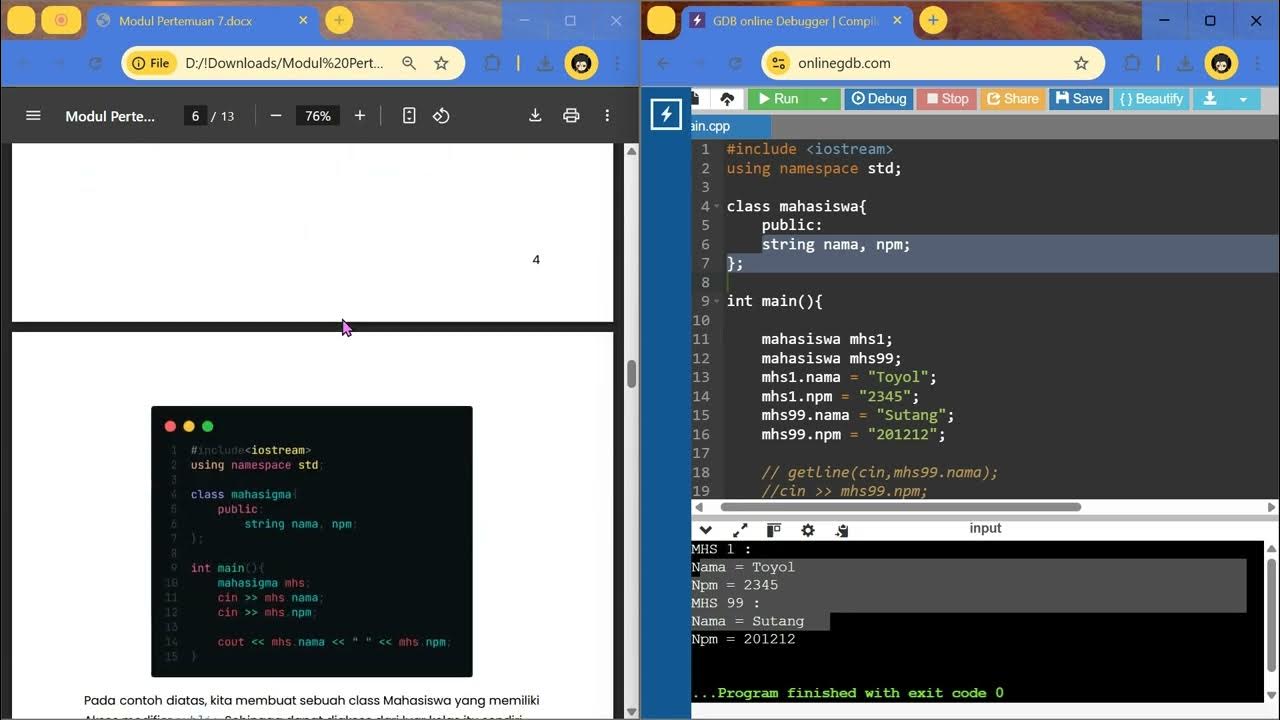12 التنفيئذ اللحظي للإستعلامات LINQ Immediate execution methods
Summary
TLDRIn this tutorial, Ahmed Mohamedy dives into LINQ programming with C#, focusing on methods like `First()`, `Last()`, and handling default values. He demonstrates how to use these methods to manage lists, apply filters, and ensure safe execution even with empty lists using `FirstOrDefault()` and `LastOrDefault()`. The tutorial also covers overloading methods, sorting with `OrderBy`, and applying conditional filters before retrieving items. By the end, viewers learn how to avoid common pitfalls when working with LINQ in C#, ensuring robust and efficient code.
Takeaways
- 😀 **First() and Last()** methods retrieve the first and last elements from a collection, respectively.
- 😀 **FirstOrDefault() and LastOrDefault()** return the first or last element but avoid errors if the collection is empty by returning a default value.
- 😀 Use **filters** with LINQ methods to narrow down results, such as filtering based on conditions like `Age > 30`.
- 😀 **OrderBy()** can be used to sort the collection before applying `First()` or `Last()` to get the desired result.
- 😀 **FirstOrDefault()** is useful for handling empty collections without causing errors or exceptions.
- 😀 **LastOrDefault()** works similarly to `FirstOrDefault()` but retrieves the last element, or a default value if the collection is empty.
- 😀 When querying **databases with LINQ**, ensure that methods like `FirstOrDefault()` or `LastOrDefault()` are used to avoid returning null or causing runtime errors.
- 😀 The default behavior of LINQ methods can be adjusted using overloads, allowing for **filters** or **default values**.
- 😀 When working with empty collections or databases, it's important to handle missing data gracefully using **default values** instead of relying on exceptions.
- 😀 It's crucial to understand the difference between LINQ **query execution** and **method chaining** when applying filters or sorting operations.
Q & A
What is the main topic of the video script?
-The main topic of the video is an introduction to using Linq with C#, specifically focusing on methods like `First`, `Last`, `FirstOrDefault`, and `LastOrDefault`, and how to handle empty results in queries.
What is the purpose of the `First` and `Last` methods in Linq?
-`First` and `Last` are used to retrieve the first and last elements of a collection, respectively. They are particularly useful when querying ordered lists or databases and when you need the first or last item matching a condition.
What problem does `FirstOrDefault` solve compared to `First`?
-`FirstOrDefault` helps avoid errors by returning a default value (e.g., null) when no elements are found, instead of throwing an exception like `First` would. This is useful when querying data that may not always have results.
Why is `OrderBy` used in the script, and what effect does it have on the result?
-`OrderBy` is used to sort the elements in a collection, making sure that methods like `First` or `Last` return the correct element based on the desired ordering criteria. Without `OrderBy`, the first or last item may not be predictable.
How does Linq handle an empty list when using methods like `First` or `Last`?
-When using methods like `First` or `Last` on an empty list, an exception is thrown. However, by using `FirstOrDefault` or `LastOrDefault`, no exception is thrown, and the method returns a default value instead.
What is the significance of filtering data using predicates in Linq?
-Filtering data with predicates (e.g., `x => x.Age > 30`) allows you to refine the results returned by Linq methods. It ensures that only elements meeting certain conditions are considered, which helps to retrieve more specific data.
How does the script explain the use of default values with `FirstOrDefault` and `LastOrDefault`?
-The script explains that `FirstOrDefault` and `LastOrDefault` allow you to specify a default value when no results match the query. This prevents errors by returning a null or specified default value instead of throwing an exception when no results are found.
Can you use `FirstOrDefault` and `LastOrDefault` with filtering conditions in Linq?
-Yes, both `FirstOrDefault` and `LastOrDefault` can be used in combination with filtering conditions (like `Where` or predicates) to return the first or last element that matches a specific condition, or the default value if no match is found.
What issue does the speaker address when no items are found in a query result?
-The speaker addresses the issue of potential errors when no items are found in a query by demonstrating how `FirstOrDefault` and `LastOrDefault` can handle such cases gracefully, returning a default value instead of an error.
What is the difference between using `FirstOrDefault` with and without a filter condition?
-When using `FirstOrDefault` without a filter condition, it simply returns the first item in the list or null if the list is empty. When used with a filter condition, it returns the first item that matches the condition or null if no matching items are found.
Outlines

此内容仅限付费用户访问。 请升级后访问。
立即升级Mindmap

此内容仅限付费用户访问。 请升级后访问。
立即升级Keywords

此内容仅限付费用户访问。 请升级后访问。
立即升级Highlights

此内容仅限付费用户访问。 请升级后访问。
立即升级Transcripts

此内容仅限付费用户访问。 请升级后访问。
立即升级浏览更多相关视频

Object Oriented Programming Features Part 3 | C ++ Tutorial | Mr. Kishore

40 - Orientação Objetos - Introdução classes pt 02

Pertemuan 7 Pemrograman Terstruktur 2025

W2 L2 Jump instructions part 2

Panic vs Error - Java, C#, Go, Rust, C, & Gleam

[Arabic] Fundamentals Of Programming With C++ #005 - How The C++ Works
5.0 / 5 (0 votes)
